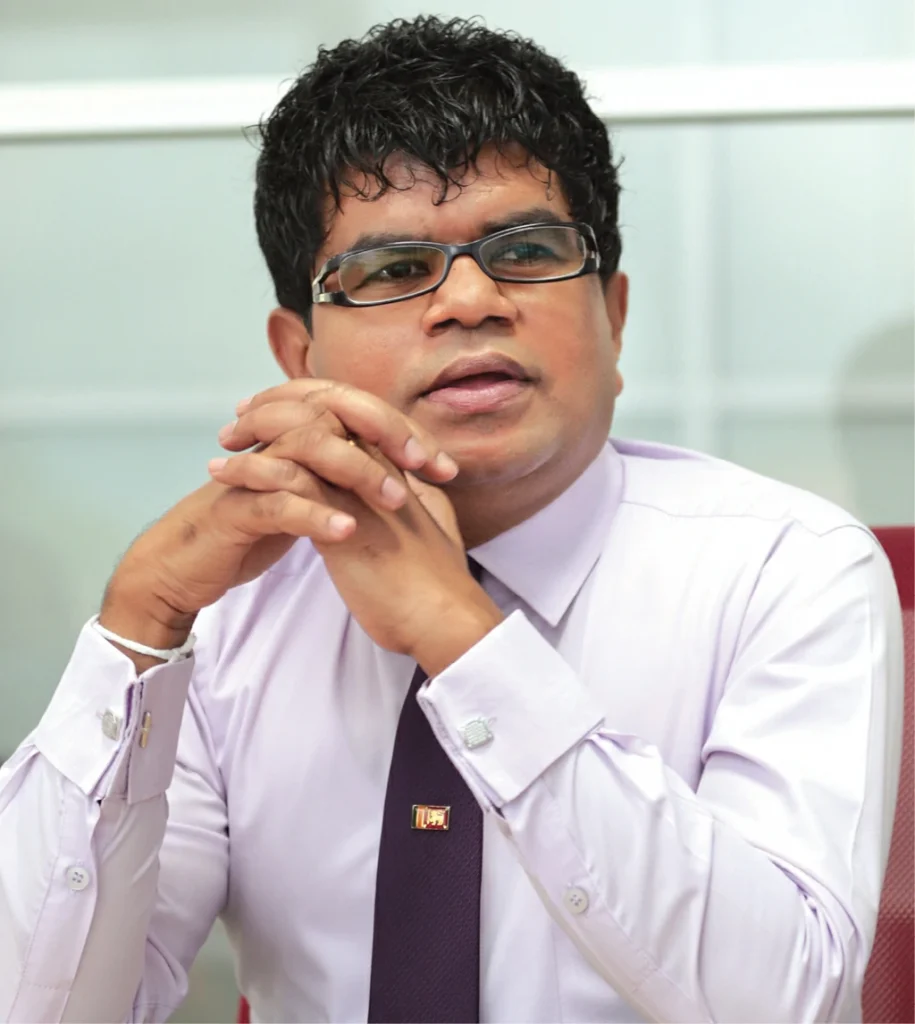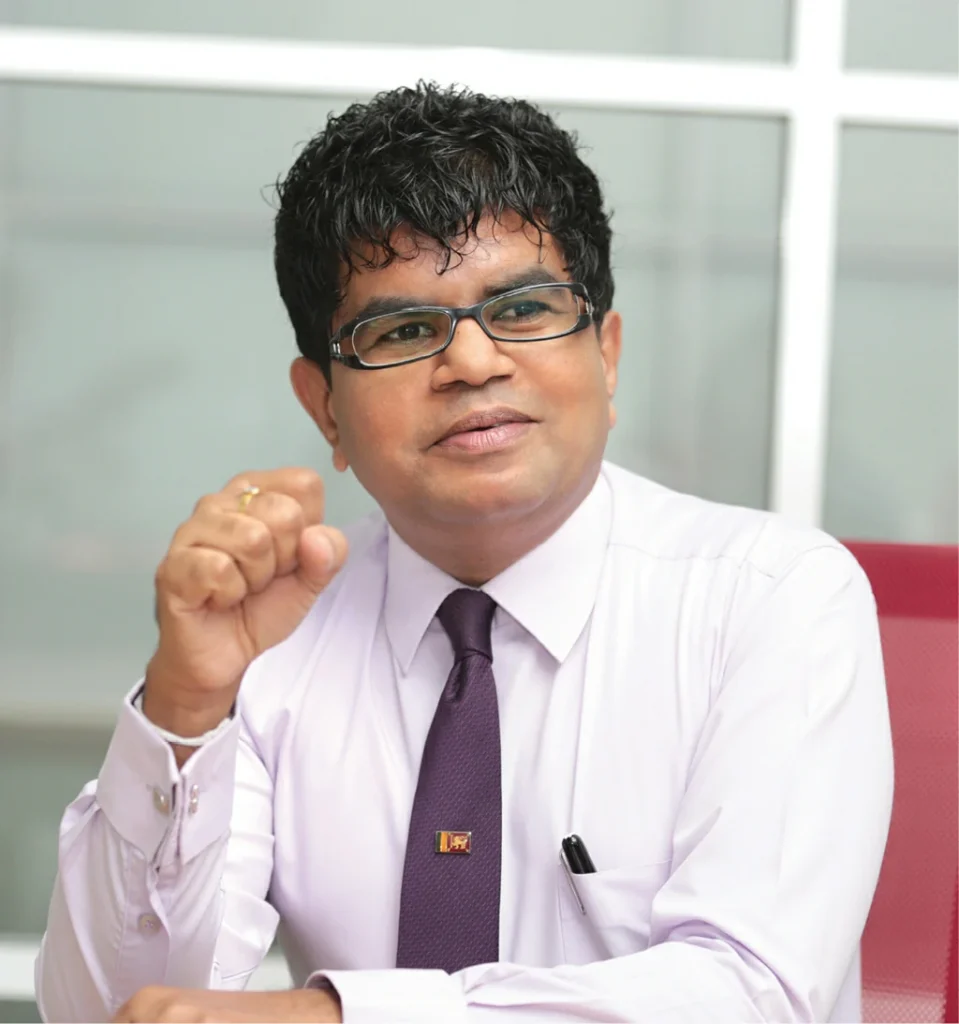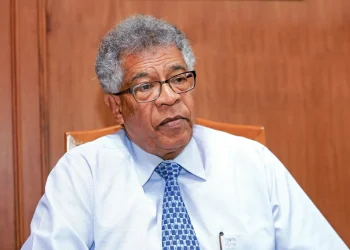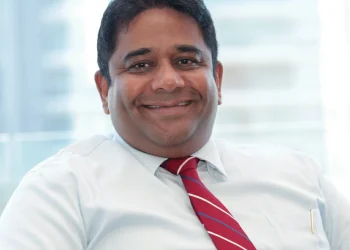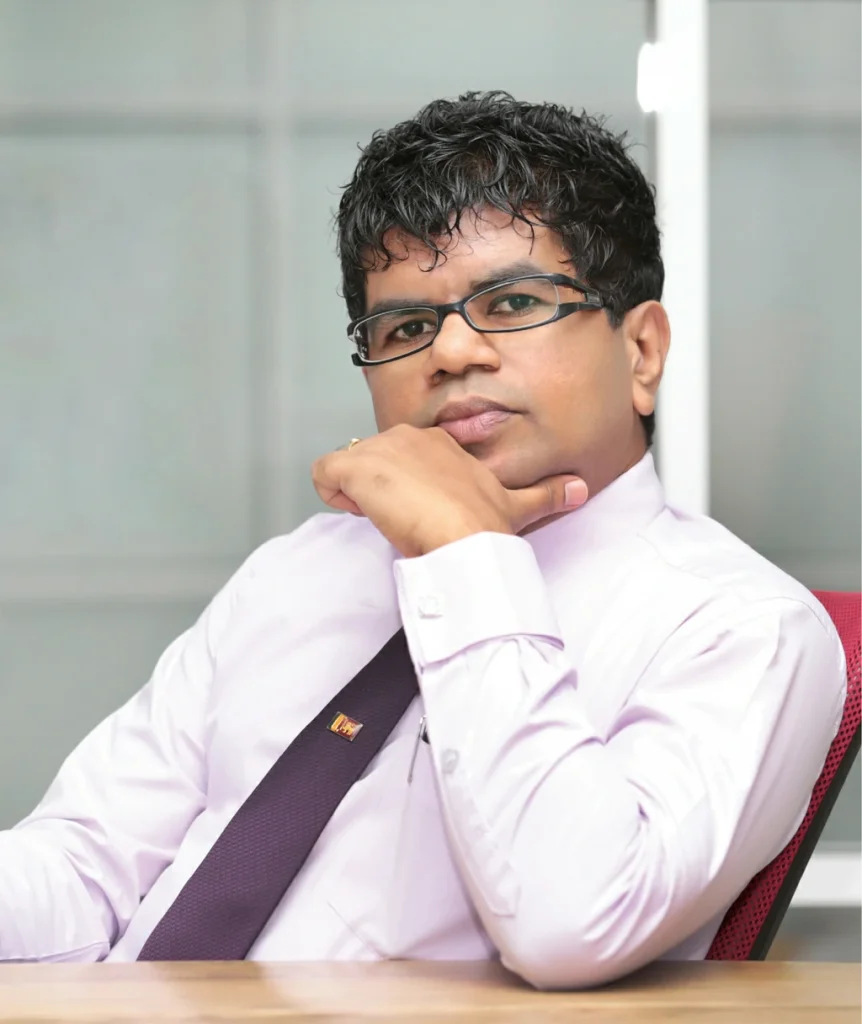
Thusitha Halloluwa is no stranger to the political landscape of Sri Lanka. He has been a key figure ensuring that any government should not be above the law of the country. His belief has always been that those voted to power should respect and work towards the betterment of the country and its people. Currently the Chairman of Colombo Commercial Fertilizer, Thusitha Halloluwa speaks about progress of the organisation. He also stressed on the point that all those who voted for Good Governance should not despair and that their vote has great value. He is confident that the President and the Government that he ensured victory for will deliver on the promises made to the people.
By Udeshi Amarasinghe. Assisted by Yomal Senarath-Yapa
Photography Mahesh Bandara and Menaka Aravinda
Can you talk about the role played by Colombo Commercial Fertilizer?
Colombo Commercial Fertilizer is the oldest state fertilizer company, which was founded in the late 1880s. There is one another state owned company importing fertilizer. These are the only two fertilizer companies in the public sector. We have a great responsibility with regards to the farmers and the agriculture of this country.
Colombo Commercial Fertilizer is entrusted with the responsibility of ensuring that there is a sufficient supply of fertilizer and that it is distributed to the farmers efficiently. That is our main responsibility.
There has been much discussion about the fertilizer subsidy, what are your thoughts on this?
Previously with the introduction of the fertilizer subsidy, low quality fertilizer began arriving in the country. This resulted in great damage to the environment. Therefore, the current Government, especially Mr Duminda Dissanayake, Minister of Agriculture, began focusing his attention on the quality of the fertilizer. We started testing the fertilizer that was arriving in the country to ensure that the required standard was maintained.
Consequently, regulations with regards to the importation of fertilizer for both the public and private sector were tightened. We insist on high quality fertilizer.
One of the most discussed areas when it comes to agriculture and fertilizer is the conversion to organic fertilizer. However, agriculturalists have noted that Sri Lanka cannot completely convert to organic fertilizer as our soil has been conditioned to chemical fertilizer for a long time. If we completely change, they predict that in about five years the harvest produced will decrease drastically.
Private Sector Companies Have Greater Independence And Have The Ability To Make Decisions According To The Market; A Privilege We Do Not Have.
Thus, as a state owned fertilizer company, we attempt to use mixed fertilizer as much as possible: that is, a hybrid of chemical and organic fertilizers. By introducing this type to the farmers and the market we are attempting to reduce the harm that is done to the soil and environment.
As the chairman, what are your plans for the organisation?
During the time I took over, the fertilizer subsidy was in operation. The only task we had was to distribute the fertilizer among farmers. Due to a decision taken last year the fertilizer subsidy was discontinued. At present, the company must compete with the private sector as well. We have introduced many strategies to successfully face this situation. We have also restructured the organisation to become more efficient.
When it comes to fertilizer one of the main issues that the people are concerned about is its transportation. In a world where technology has made things convenient they require something that is less cumbersome and easier to use. We are planning to introduce the small pellets, which consist of organic and chemical fertilizer. A kilogram of this fertilizer equals to about 10-20kg of normal fertilizer. This will make transportation much easier.
We will also be introducing fertilizer that is specially made for people who want to cultivate inside their apartments and houses.
How have farmers responded to new technology?
So far it has been good, however we need to educate them further. Agriculture in Sri Lanka is still very traditional, as such technology is absorbed extremely slowly. Since we have also experienced various health issues including the pollution of water due to the use of low quality fertilizer farmers too are open to new methods and technology.
This Moment When The Parties Have Joined Together Is The Best Time We Have To Cast Away Opportunism And Create A Plan To Build The Country- At Least For A Period Of 10-15 Years. This Is The Best Time To Draft New Policies And Implement Them As Well.
We have a project in the pipeline where we test the soil and supply fertilizer containing the components that are lacking in that particular sample of soil. For example, if soil in an area is detected to have excess nitrogen, then we will supply fertilizer with less nitrogen.
The private sector is also engaged in the sale of fertilizer, what are your thoughts on this?
There were instances when the private sector bought stocks from us and sold them in the market. However, there is a monopoly in the private sector and we have to compete with that. Previously we were the sole distributor of fertilizer, however today the farmers have the choice of buying either from us or the private sector.
We are faced with a number of challenges. As a state institution we are bound to the regulations of the Auditor General as well as the Parliament Committees. Yet, private sector companies have greater independence and have the ability to make decisions according to the market; a privilege we do not have.
You are very vocal on your political views and have stood firm on what you believe in. Can you tell us about your thoughts on the political system in Sri Lanka?
Sri Lanka will next year be celebrating her 70th Independence Day. As the country reaches this milestone we face a number of challenges. We have to really think about what we have achieved in the last 70 years. When we gained Independence in 1948 we were not in debt to the world. We had a thriving estate sector. The British had left us with quite an extensive road network, train network and a system of law. Much of our archeological sites were uncovered by them.
During the past 70 years we have not been able to even sustain what the British achieved in 140 years. At the time we got Independence, Singapore and Malaysia took us as an example. But today they are ahead of us. We should look back and identify where we made mistakes. I believe that this is the best point to turn back and identify where we went wrong.
During these 70 years we had two youth rebellions; one in ’71 and another in ’88 – ’89. The respective governments in both instances suppressed the rebellions using force. But have we actually analysed at the cause for these youth unrests? We had for 30-years a terrorist conflict. While the war was ended militarily we still need to address the social issues. We have to look at a long term solution to ensure that such a disaster never happens again.
I believe that while all governments focused on day to day matters none had a long term plan, which is the reason for the current situation.
Our education system does not meet global needs. The current trend globally is to educate the child while ensuring his mental freedom as well. But in Sri Lanka today, the 18-year old who comes out of school education is a depressed individual suffering from stress. He has gone through competition from grade four and then through ‘O’ levels and ‘A’ levels. In the ‘40s and the ‘50s our universities were among the top 100 in the world, but today we are way below 1500.
From 1948, governments were formed either by the UNP or the SLFP. They were the two parties who governed the country for the past 70 years. This is the first time both parties have come together and have formed one Government. If we cannot solve educational, economic, social, legal issues when the two parties have formed a coalition, what better opportunity could be there?
There are grieving parents from across all communities who need to know exactly what happened to their children. Don’t they too have a right to know what happened to their children? This hostile stance taken by our leaders show that our politicians have never worked according to a proper plan.
This moment when the parties have joined together is the best time we have to cast away opportunism and create a plan to build the country- at least for a period of 10-15 years. This is the best time to draft new policies and implement them as well.
If This System Continues People Who Have The Best Interests Of The Country At Heart Will Avoid Politics; Only Those Looking For Easy Money Will Contest. What Is The Future Of The Country?
In the past the people and the country were represented by persons deemed themost educated and intelligent. They were never accused of major corruption. But with the introduction of the new constitution and election system in 1978, the entire political landscape of the country changed. We se a great political failure. Due to the current corrupt system educated as well as respected individuals stay away from politics.
If this system continues people who have the best interests of the country at heart will avoid politics; only those looking for easy money will contest. What is the future of the country?
Then what is the solution?
The election system and also the country’s constitution should be changed. The current coalition Government will present a new constitution. I believe that it is everyone’s duty to support the new constitution and the new electoral system.
In order to bring respectable citizens into the political arena the present system has to be changed.
On January 8, 2015 people voted for that change. One of the main components of the 100-day programme as well as the Presidential Manifesto was that they will change the electoral system, abolish executive presidency and bring about a plan for the devolution of power. That is why the people voted for them. Today, the problem is that many leaders who were at the forefront on January 8 have now backed off. Instead a different group of people who were not part of the January 8 victory or the General Elections have come to the front. There is also a group of opportunists who are attempting gain power. There a certain section within the government who are ensuring that the needs of the above group are met.
This is why the current Government cannot achieve anything. Today we do not see in the Government the enthusiasm or the responsibility that was visible on January 8, because the majority joined after August 2015. That is the cause for this sad situation.
The President and the Prime Minister want to introduce the new constitution. After they do that, I believe that civil societies and everyone who loves the country will see that it is implemented properly. If this is not achieved at that point, it will never happen.
This is the hour of decision. If we can change the constitution at this time when there is a coalition of parties, it will be a great victory. If it does not happen now no one can tell where things will go.
This is the time when civil societies and everyone in the country must unite and demand for a new constitution to be adopted and a change of the electoral system.
You have been demanding for a change from 2010. You were part of the Alliance (Sandana) Government. And you were part of January 8, 2015 as well. Would you consider all these instances as failures?
I do not agree. These cannot be termed as failures. I played a key role in the forming of the Peoples Alliance Government. Minister Mangala Samaraweera was one of the people who were at the helm at that time.
The Alliance was not a political party. There was no time to register it as a party. The only party we could obtain at that time was called Bahu Jana Nidahas Peramuna. The secretary of the party was Victor Perera. I met him in Kotte. But due to a friction between him and President Chandrika he refused to give the party. I met him again. He finally relented and said that he is giving the party purely because of me. It was that party that we named United People’s Freedom Alliance. We changed the party sign from a butterfly to a betel leaf.
We were prepared for the General Election and published our manifesto. I was at that time the media secretary for Her Excellency the President and Director of the SLFP Media Unit. The office was located in Darley Road, in the fourth floor of the party headquarters.
About two weeks prior to the elections I went to the office and found a manifesto on my table. I read it and found that it was not the manifesto we were planning to publish. While I was reading it I received a call from Mangala Samarweera who was an MP at that time and he was in Matara when he called.
He said that there was a grave issue; that another manifesto was being distributed. At that time the Alliance had been formed by the SLFP and the JVP. Mangala Samaraweera said that the JVP was attempting to get out of the Alliance. This obviously would have spelt quite a defeat for the SLFP and the UNP would then emerge victorious. I was given the task to stop this from happening.
Immediately afterwards I received a call from MP Wimal Weerawansa. He said that they have decided to move out of the alliance at 12. It was 10.30 at the time. He asked me to try and stop distributing the other manifesto, or they would call a press conference and back out.
They Are Now Dispersed. We Expect To And Must Bring Them All Together And Instill Energy Again Into This Government And Progress In This Journey While Realising All That We Envisioned On January 8.
Then the JVP Chairman of the time, Nandana Gunathilaka, called, followed by Janadasa Peiris. Everyone told me that I was the only one who could put a stop to this or the alliance would end. Losing the alliance would mean losing the government.
I was able to stop the distribution of the second manifesto and the correct one was distributed. Everyone who had appealed to me called to thank me. But that was only the beginning of the problem. The next day I came to the office to find that President Chandrika had sent the PSD to seal my office. On the same day I got the letter informing me that I had been removed from the position of media secretary.
Before I stopped the distribution of the manifestos the previous day I had reflected on the situation. I was the President’s Media Secretary and taking that action was going against the orders of the President. If I was self-seeking I would have wanted to retain my position and supported whatever Madam Chandrika did. If I did that there would be no Alliance. I decided that I would do the right thing, even at the cost of losing everything, and stopped the distribution.
To save the Alliance, I issued a press release with my signature asking the public not to be duped by others who have published and is distributing a false manifesto in order to disrupt our campaign. Throughout the entire election period the story of two manifestos was debated, however the story that went public was that others had published a manifesto to derange our campaign.
At that time Rajitha Senaratne was in the UNP and had debated a lot on this issue. After rejoining the SLFP later, he sat down with Wimal Weerawansa (then minister) and they discussed this issue, especially the role I played in it. Everyone who tried to disrupt the alliance were given positions. Despite the key role I played in saving the alliance and securing victory, I got nothing at all during those years.
While I may have not received private gains I was able to lead to victory in all that I believed in. I succeeded in what I wanted to do. In taking a conscientious decision I lost all positions and glory. But after establishing the government Minister Mangala Samaraweera and others told me not to worry, assuring me that the Government is there because of me.
The Government We Defeated On January 8 Was Not A Traditional Government. It Was A Presidency That Had Great Power And There Was A Large Network Of Individuals Who Wielded The Executive Power. It Was Such A Huge Network That We Defeated.
Even though I lost many things personally I was able to carry my beliefs to victory and do right by the country. I did all I could. Now, too, I am trying to rally together those who were there on January 8 and ensure that we move forward. Only those who were together on January 8th know why we came on this journey, our motives and our plans for the country. It was not done for personal gain. The likes of Rajitha Senanayake and Duminda Dissanayake joined this cause of the good governance for the betterment of the country and its people in mind. And we took up the challenge at great personal risk. They are now dispersed. We expect to and must bring them all together and instill energy again into this Government and progress in this journey while realising all that we envisioned on January 8.
Today, those who voted and those who came to power on the votes are all in a confused state. What can you tell us about this?
The Government we defeated on January 8 was not a traditional government. It was a Presidency that had great power and there was a large network of individuals who wielded the executive power. It was such a huge network that we defeated.
After defeating such a rule, it is not fair to expect a complete reversal of that regime in a short period of time. For example, projects begun during the previous regime on foreign credit came to nothing. The Hambantota harbour, the airport and conference halls are all projects that have not generated any income to the country. Even though they are profitless projects there were many people who swindled large sums of money from these projects.
Today the Government is directing the economy with a plan. During the past two and a half years this Government has done nothing harmful to the country. The united opposition is shouting without rhyme or reason because they can’t find anything against the Government.
The main accusation levelled at the current Government is that they are selling the country. To whom was the country sold?
The current Government has one weakness: they do not publicise the work that they do. That is the only weakness. Is the cost of living high? Compared to the previous regime it is low. Corruption is at a very low level compared to the previous regime.
Today officials say that they are scared of the CID, the FCID. That translates into being scared of stealing and dishonesty. Therefore, discipline is being installed in the country.
We should be content that country that at one time was without law and discipline, in a state of corruption for ten years, has reached this level in two and a half years. Those who voted for the good governance Government have no cause to regret. There is no reason for those who brought Maithripala Sirisena or the government to power to be disappointed. They have in fact done a very worthy deed; a pin. The Government has given value to the vote cast by the people. None of their rights have been violated.
Today there are many protests on the roads. Doesn’t this show that democracy and the people’s rights have been preserved to the fullest? Those who voted for the current Government have no cause for regret. Their vote has been given a value.
We have been in power only for two and a half years. In the coming two and a half years the Government will correct its errors and go forward. The only issue affecting the current Government is the group I mentioned. People will give their verdict on this group soon.
What has happened to the SLFP?
Looking at political parties in Sri Lankan history, we see in ’71 the leaders of the JVP were either imprisoned or murdered. But did that destroy the party? No. It was probably in the ‘80s under J R Jayawardene’s regime that Sri Lanka saw a political party splitting up to the most number of pieces. The leader of the SLFP, Sirimavo Bandaranaike, was deprived of her civic rights. Her son, the son of the party’s founder, broke away to form a new party; so did her son-in-law. Subsequently, T B Illangaratne and Maitripala Senanayake formed new parties. Those parties too drew crowds. But in the end, wasn’t it only the SLFP, led by Sirimavo Bandaranaike, that survived? All the others had to come back and join the party under Mrs Bandaranaike.
In the early 90s, the very spirit of the UNP, including Lalith, Gamini and Premachandra, left and formed the ‘eagle’ party. Just like the former President’s new party, the ‘eagle’ party also drew crowds. But what happened in the end? The elephant (UNP main party) survived with the leader and the dissension came to an end. The same happened to the party formed by Vijaya Kumaratunge. In both cases, the members had to rejoin either the UNP or SLFP.
In another instance S B Dissanayake broke away with a group of 13. At the end they too had to choose between SLFP and UNP. This shows that the main party with the leader will survive; other groups are temporary.
In the history of party politics in Sri Lanka, the unique stance was that of J R Jayawardene in that he never gave money or positions to members who did not belong to the UNP. He did his best to protect the party and members. He protected the people who brought him to power. This is the reason J R Jayawardene remained the leader of the party even during retirement. All leaders went to him for advice. He was the undisputed leader of the party till his passing away. The people of the party loved him because he never forgot those who brought him to power.
The People Who Voted For The Present Good Governance Government Should Not Despair. The Government Has A Plan And We Are Moving In The Right Direction. The People Must Always Know That There Is A Value In Their Vote.
After J R Jayawardene President Premadasa come into power. He formed a limited, close circle with people who did not help him get into power and went on a path of his own. This resulted in the party breaking up.
His successor Chandrika Kumaratunge did not learn a lesson from his mistakes, and after becoming President, she ignored those who brought her to power and began associating with a separate group. Those in her group were charged with a serious accusations and as a result that party broke away.
Once Mahinda Rajapaksa came into power SLFPers who were disenchanted with President Chandrika Kumaratunga thought that he would do them justice. But he too picked a several UNPers, gave them prominence, forgot the SLFPers and destroyed the party.
The UNP was led by Ranil Wickremesinghe for a long period of time and he is still the Leader of the Party. During that time so many politicians formed groups. They rebelled against the leader, marched, held protests at the head-quarters Srikotha; so much fiasco happened. But what happened in the end was that the party survived intact with the leader and the dissenters came back to stand by its side.
So historically it was the main party with the leader at its helm that had always survived. The dissenting groups are short-lived. What we can deduce from this is that the current Government can go its journey only as long
as it stays with those who brought it to power on January 8 and during the August General Elections. If it draws close a certain group of opportunists, the fate of all those previous Governments will also fall on the present Government as well.
Even Maithripala Sirisena broke away from the SLFP because of Mahinda Rajapaksa’s quite misplaced preferences. I believe that all leaders should learn that aspect of JR’s conduct: that you should always be loyal to the people who brought you to power and protect them.
Leaders should realize that when someone who did not help you to power gets close that is not victory. Mahinda Rajapaksa made the error of thinking it was a victory, but it is not. When one such person comes close a hundred others who faithfully toiled for you leave you. It has happened in every Government. It was because Mahinda Rajapaksa made that mistake we could topple his Government. Unknown to him there were many party members who were disappointed with his behaviour.
Future?
The people who voted for the present good governance Government should not despair. A more disciplined political culture is emerging.The Government has a plan and we are moving in the right direction. The people must always know that there is a value in their vote. We should join together with the President and the Government to take the country forward.
